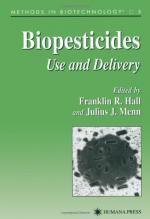|
This section contains 830 words (approx. 3 pages at 300 words per page) |

|
A pesticide is a chemical that is used to kill insects, weeds, and other organisms to protect humans, crops, and livestock. A broad-spectrum pesticide that kills all living organisms is called a biocide. Fumigants, such as ethylene dibromide or dibromochloropropane, used to protect stored grain or sterilize soil fall into this category. Generally, however, we prefer narrower spectrum agents that attack a specific type of pest: herbicides kill plants; insecticides kill insects; fungicides kill fungi; acaricides kill mites, ticks, and spiders; nematicides kill nematodes (microscopic roundworms); rodenticides kill rodents; and avicides kill birds. Pesticides can also be grouped by their method of application (fumigation, for example, is dispersal as a gaseous vapor) or by their mode of action (an ovicide kills the eggs of pests).
There are thousands of kinds of natural pesticides. Plants have been engaged for millions of years in chemical warfare with predators, most of...
|
This section contains 830 words (approx. 3 pages at 300 words per page) |

|


